中国古诗词英译
- 格式:ppt
- 大小:139.00 KB
- 文档页数:64
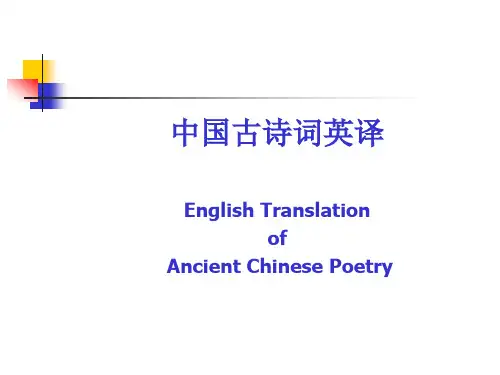
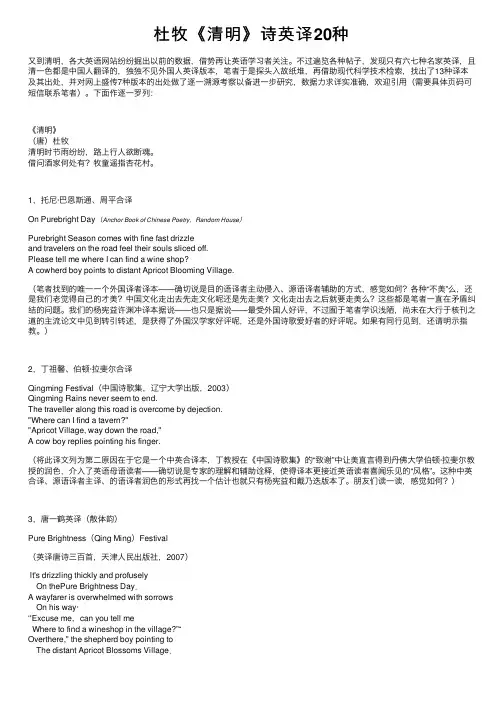
杜牧《清明》诗英译20种⼜到清明,各⼤英语⽹站纷纷掘出以前的数据,借势再让英语学习者关注。
不过遍览各种帖⼦,发现只有六七种名家英译,且清⼀⾊都是中国⼈翻译的,独独不见外国⼈英译版本,笔者于是探头⼊故纸堆,再借助现代科学技术检索,找出了13种译本及其出处,并对⽹上盛传7种版本的出处做了逐⼀溯源考察以备进⼀步研究,数据⼒求详实准确,欢迎引⽤(需要具体页码可短信联系笔者)。
下⾯作逐⼀罗列:《清明》(唐)杜牧清明时节⾬纷纷,路上⾏⼈欲断魂。
借问酒家何处有?牧童遥指杏花村。
1,托尼·巴恩斯通、周平合译On Purebright Day(Anchor Book of Chinese Poetry,Random House)Purebright Season comes with fine fast drizzleand travelers on the road feel their souls sliced off.Please tell me where I can find a wine shop?A cowherd boy points to distant Apricot Blooming Village.(笔者找到的唯⼀⼀个外国译者译本——确切说是⽬的语译者主动侵⼊、源语译者辅助的⽅式,感觉如何?各种“不美”么,还是我们⽼觉得⾃⼰的才美?中国⽂化⾛出去先⾛⽂化呢还是先⾛美?⽂化⾛出去之后就要⾛美么?这些都是笔者⼀直在⽭盾纠结的问题。
我们的杨宪益许渊冲译本据说——也只是据说——最受外国⼈好评,不过囿于笔者学识浅陋,尚未在⼤⾏于核刊之道的主流论⽂中见到转引转述,是获得了外国汉学家好评呢,还是外国诗歌爱好者的好评呢。
如果有同⾏见到,还请明⽰指教。
)2,丁祖馨、伯顿·拉斐尔合译Qingming Festival(中国诗歌集,辽宁⼤学出版,2003)Qingming Rains never seem to end.The traveller along this road is overcome by dejection."Where can I find a tavern?""Apricot Village, way down the road,"A cow boy replies pointing his finger.(将此译⽂列为第⼆原因在于它是⼀个中英合译本,丁教授在《中国诗歌集》的“致谢”中让美直⾔得到丹佛⼤学伯顿·拉斐尔教授的润⾊,介⼊了英语母语读者——确切说是专家的理解和辅助诠释,使得译本更接近英语读者喜闻乐见的“风格”。
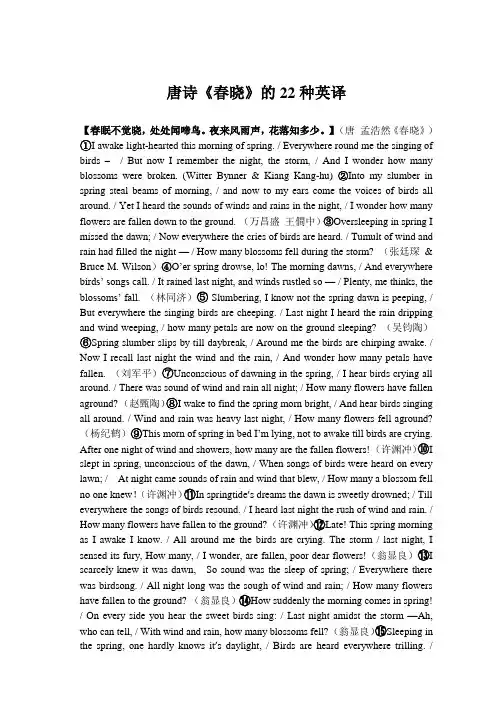
唐诗《春晓》的22种英译【春眠不觉晓,处处闻啼鸟。
夜来风雨声,花落知多少。
】(唐孟浩然《春晓》)①I awake light-hearted this morning of spring. / Everywhere round me the singing of birds –/ But now I remember the night, the storm, / And I wonder how many blossoms were broken. (Witter Bynner & Kiang Kang-hu) ②Into my slumber in spring steal beams of morning, / and now to my ears come the voices of birds all around. / Yet I heard the sounds of winds and rains in the night, / I wonder how many flowers are fallen down to the ground. (万昌盛王僴中)③Oversleeping in spring I missed the dawn; / Now everywhere the cries of birds are heard. / Tumult of wind and rain had filled the night — / How many blossoms fell during the storm? (张廷琛& Bruce M. Wilson)④O’er spring drowse, lo! The morning dawns, / And everywhere b irds’ songs call. / It rained last night, and winds rustled so — / Plenty, me thinks, the blossoms’ fall. (林同济)⑤ Slumbering, I know not the spring dawn is peeping, / But everywhere the singing birds are cheeping. / Last night I heard the rain dripping and wind weeping, / how many petals are now on the ground sleeping? (吴钧陶)⑥Spring slumber slips by till daybreak, / Around me the birds are chirping awake. / Now I recall last night the wind and the rain, / And wonder how many petals have fallen. (刘军平)⑦Unconscious of dawning in the spring, / I hear birds crying all around. / There was sound of wind and rain all night; / How many flowers have fallen aground? (赵甄陶)⑧I wake to find the spring morn bright, / And hear birds singing all around. / Wind and rain was heavy last night, / How many flowers fell aground? (杨纪鹤)⑨This morn of spring in bed I’m lying, not to awake till birds are crying. After one night of wind and showers, how many are the fallen flowers! (许渊冲)⑩I slept in spring, unconscious of the dawn, / When songs of birds were heard on every lawn; / At night came sounds of rain and wind that blew, / How many a blossom fell no one knew!(许渊冲)⑪In springtide’s dreams the dawn is sweetly drowned; / Till everywhere the songs of birds resound. / I heard last night the rush of wind and rain. / How many flowers have fallen to the ground? (许渊冲)⑫Late! This spring morning as I awake I know. / All around me the birds are crying. The storm / last night, I sensed its fury, How many, / I wonder, are fallen, poor dear flowers!(翁显良)⑬I scarcely knew it was dawn, So sound was the sleep of spring; / Everywhere there was birdsong. / All night long was the sough of wind and rain; / How many flowers have fallen to the ground? (翁显良)⑭How suddenly the morning comes in spring! / On every side you hear the sweet birds sing: / Last night amidst the storm —Ah, who can tell, / With wind and rain, how many blossoms fell? (翁显良)⑮Sleeping in the spring, one hardly knows it’s daylight, / Birds are heard everywhere trilling. /There’ve been sounds of wind and rain in the night, / How many blossoms have been falling? (翁显良)⑯I slept in spring not conscious of the dawn, / But heard the gay birds chattering all round, / I remember, there was a storm at night. / Pray, how many blossoms have fallen down? (翁显良)⑰Sleeping in spring oblivious of dawn / everywhere I hear birds / after the wind and rain last night / I wonder how many petals fell (Red Pine) ⑱Asleep in the spring, dawn comes to me unawares; / I hear the birds singing all round. / When night comes there’s the sound of wind and rain; / Who knows how many blossoms fall to the ground. (Peter Harris)⑲I scarcely knew it was dawn, / So round was the sleep of spring; / Everywhere there was birdsong. / All night long was the sough of wind and rain; / How many flowers have fallen to the ground? (刘师舜1967)⑳How suddenly the morning comes in Spring! / On every side you hear the sweet birds sing. / Last night amidst the storm – Ah, who can tell, / With wind and rain, how many blossoms fell? (DAWN IN SPRING John Turner) 21.In drowsy spring I slept till daybreak / When the birds cry here and there, I awake. / Last night I heard a storm of wind and rain, / How many blossoms have fallen again? (《中国翻译》杂志2001年第2期)22. This spring morning in bed I’m lying / Not awake till I hear birds crying. / After one night of wind and showers / How many are the fallen flowers? (《中国翻译》杂志2001年第2期)注:这是本人正在编著的《汉英翻译大辞典》中的一个词条。
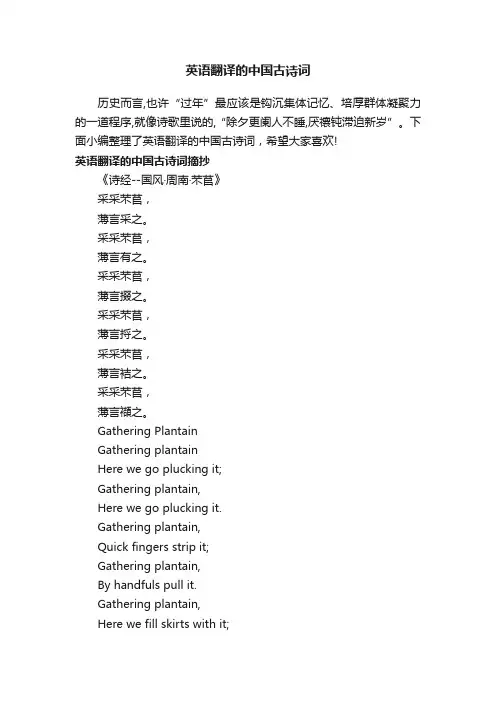
英语翻译的中国古诗词历史而言,也许“过年”最应该是钩沉集体记忆、培厚群体凝聚力的一道程序,就像诗歌里说的,“除夕更阑人不睡,厌禳钝滞迫新岁”。
下面小编整理了英语翻译的中国古诗词,希望大家喜欢!英语翻译的中国古诗词摘抄《诗经--国风·周南·芣苢》采采芣苢,薄言采之。
采采芣苢,薄言有之。
采采芣苢,薄言掇之。
采采芣苢,薄言捋之。
采采芣苢,薄言袺之。
采采芣苢,薄言襭之。
Gathering PlantainGathering plantainHere we go plucking it;Gathering plantain,Here we go plucking it.Gathering plantain,Quick fingers strip it;Gathering plantain,By handfuls pull it.Gathering plantain,Here we fill skirts with it;Gathering plantain,Belt up full skirts!英语翻译的中国古诗词鉴赏《诗经--国风·周南·汝坟》遵彼汝坟,伐其条枚;未见君子,惄如调饥。
遵彼汝坟,伐其条肄;既见君子,不我遐弃。
鲂鱼赪尾,王室如毁;虽然如毁,父母孔迩。
A Wife WaitingAlong the raised bank greenI cut down twigs and wait.My lord cannot be seen,I feel a hunger great.Along the raised bank greenI cut fresh sprig and spray.My lord can now be seen,I feel not cast away.The bream has fire-red tail,My lord has fire-red eye.He fires to no avail,Our parents are near-by.英语翻译的中国古诗词赏析《诗经--国风·周南·汉广》南有乔木,不可休息。
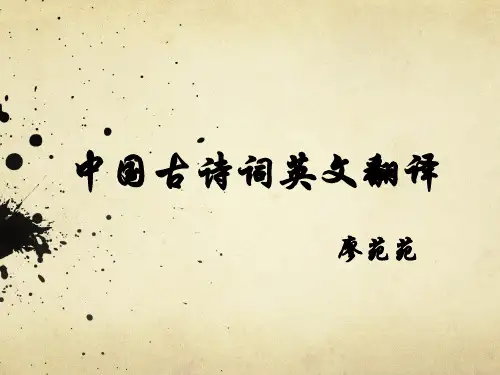
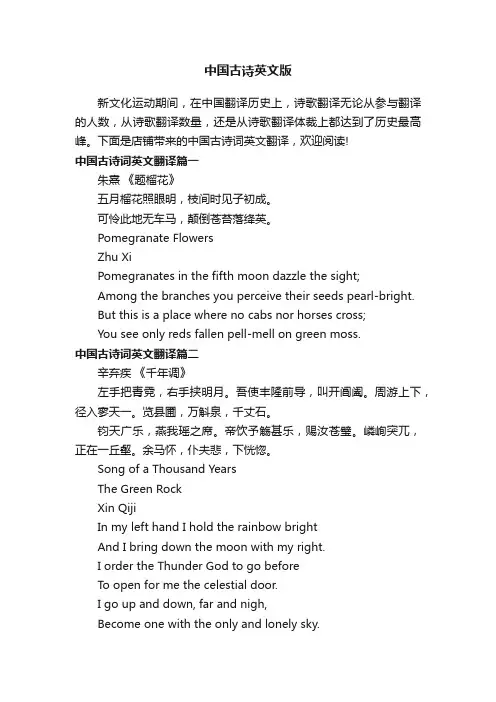
中国古诗英文版新文化运动期间,在中国翻译历史上,诗歌翻译无论从参与翻译的人数,从诗歌翻译数量,还是从诗歌翻译体裁上都达到了历史最高峰。
下面是店铺带来的中国古诗词英文翻译,欢迎阅读!中国古诗词英文翻译篇一朱熹《题榴花》五月榴花照眼明,枝间时见子初成。
可怜此地无车马,颠倒苍苔落绛英。
Pomegranate FlowersZhu XiPomegranates in the fifth moon dazzle the sight;Among the branches you perceive their seeds pearl-bright.But this is a place where no cabs nor horses cross;You see only reds fallen pell-mell on green moss.中国古诗词英文翻译篇二辛弃疾《千年调》左手把青霓,右手挟明月。
吾使丰隆前导,叫开阊阖。
周游上下,径入寥天一。
览县圃,万斛泉,千丈石。
钧天广乐,燕我瑶之席。
帝饮予觞甚乐,赐汝苍璧。
嶙峋突兀,正在一丘壑。
余马怀,仆夫悲,下恍惚。
Song of a Thousand YearsThe Green RockXin QijiIn my left hand I hold the rainbow brightAnd I bring down the moon with my right.I order the Thunder God to go beforeTo open for me the celestial door.I go up and down, far and nigh,Become one with the only and lonely sky.I see the hanging mountainAnd the inexhaustible fountain,And the green rock of a thousand feet high.Hearing heavenly music played,I’m feasted by the Pool of jade.Our Lord invites me to wineAnd gives me a mini-cliff divine.Rugged and steep,It epitomizes mountain high and valley deep.My horse won’t leave,My servant seems to grieve.Awake, I don’t believe.中国古诗词英文翻译篇三陶渊明《归去来兮辞》余家贫,耕植不足以自给。
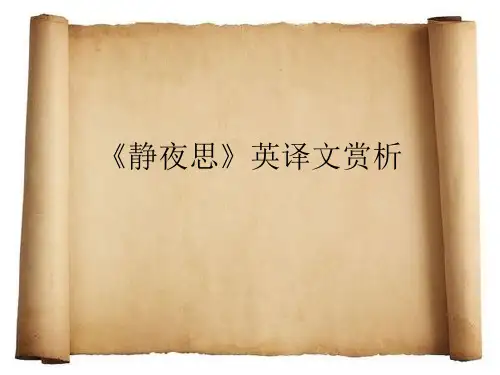
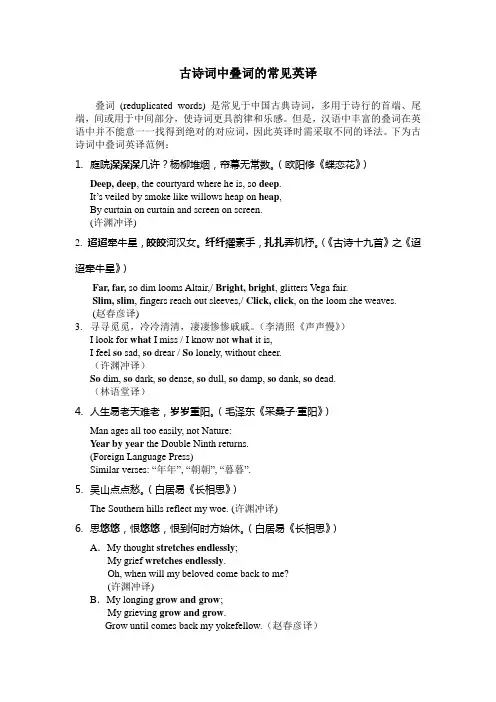
古诗词中叠词的常见英译叠词(reduplicated words) 是常见于中国古典诗词,多用于诗行的首端、尾端,间或用于中间部分,使诗词更具韵律和乐感。
但是,汉语中丰富的叠词在英语中并不能意一一找得到绝对的对应词,因此英译时需采取不同的译法。
下为古诗词中叠词英译范例:1.庭院深深深几许?杨柳堆烟,帘幕无常数。
(欧阳修《蝶恋花》)Deep, deep, the courtyard where he is, so deep.It’s veiled by smoke like willows heap on heap,By curtain on curtain and screen on screen.(许渊冲译)2. 迢迢牵牛星,皎皎河汉女。
纤纤擢素手,扎扎弄机杼。
(《古诗十九首》之《迢迢牵牛星》)Far, far, so dim looms Altair,/ Bright, bright, glitters Vega fair.Slim, slim, fingers reach out sleeves,/ Click, click, on the loom she weaves.(赵春彦译)3.寻寻觅觅,冷冷清清,凄凄惨惨戚戚。
(李清照《声声慢》)I look for what I miss / I know not what it is,I feel so sad, so drear / So lonely, without cheer.(许渊冲译)So dim, so dark, so dense, so dull, so damp, so dank, so dead.(林语堂译)4.人生易老天难老,岁岁重阳。
(毛泽东《采桑子·重阳》)Man ages all too easily, not Nature:Year by year the Double Ninth returns.(Foreign Language Press)Similar verses: “年年”, “朝朝”, “暮暮”.5.吴山点点愁。
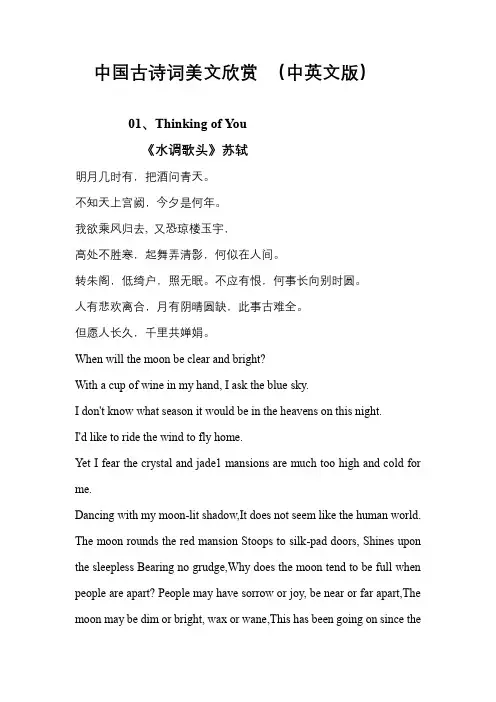
中国古诗词美文欣赏(中英文版)01、Thinking of You《水调歌头》苏轼明月几时有,把酒问青天。
不知天上宫阙,今夕是何年。
我欲乘风归去, 又恐琼楼玉宇,高处不胜寒,起舞弄清影,何似在人间。
转朱阁,低绮户,照无眠。
不应有恨,何事长向别时圆。
人有悲欢离合,月有阴晴圆缺,此事古难全。
但愿人长久,千里共婵娟。
When will the moon be clear and bright?With a cup of wine in my hand, I ask the blue sky.I don't know what season it would be in the heavens on this night.I'd like to ride the wind to fly home.Yet I fear the crystal and jade1 mansions are much too high and cold for me.Dancing with my moon-lit shadow,It does not seem like the human world. The moon rounds the red mansion Stoops to silk-pad doors, Shines upon the sleepless Bearing no grudge,Why does the moon tend to be full when people are apart? People may have sorrow or joy, be near or far apart,The moon may be dim or bright, wax or wane,This has been going on since thebeginning of time.May we all be blessed with longevity Though far apart, we are still able to share the beauty of the moon together.02、《出师表》Memorial to the Throne on His Expedition诸葛亮亲贤臣,远小人,此先汉所以兴隆也;亲小人,远贤臣,此后汉所以倾颓也。
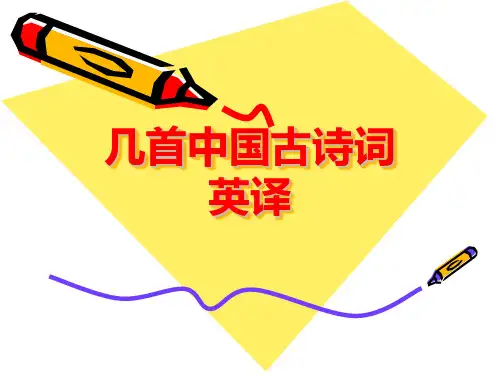
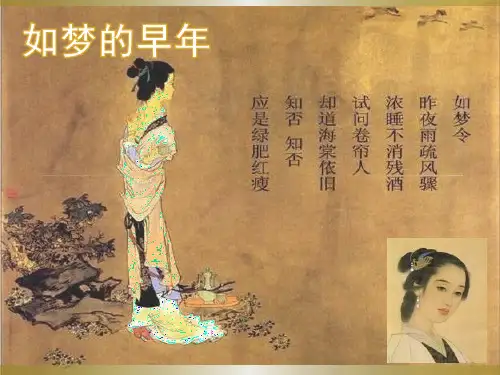
《江雪》英译文对比赏析柳宗元,《江雪》:千山鸟飞绝,万径人踪灭。
孤舟蓑笠翁,独钓寒江雪。
译文一:River Snow。
A hundred mountains and no bird,A thousand paths without a footprint;A little boat, a bamboo cloak,An old man fishing in the coldriver-snow.(Translated by Witter Bynner, 摘自文殊选注《诗词英译选》,外语教学与研究出版社,1989年版)译文二:The Snowbound River。
O’v er mountains and mountains no bird is on the wing;On thousand lines of the pathways there’s no footprint,In a lone boat on the snowbound river, an old man,In palm-bark cape and straw hat, drops his angle string.(吴钧陶编译《唐诗三百首(汉英对照、文白对照)》,湖南出版社,1997年版)1 原作分析及序言在对比这篇五言绝句的英译本之前,笔者对这首诗的意境及作者柳宗元写这首诗词时的心境及时令做了充分了解。
这有助于笔者从宏观与微观角度更好地对诗词的英译本进行较有把握的评析。
整个诗句总共只有二十二个字(含标题),它主要的大意是:千山万岭不见飞鸟的踪影,千路万径不见行人的足迹。
一叶孤舟上,一位身披蓑衣头戴斗笠的渔翁,默默地在漫天风雪中垂钓。
这首五言绝句作于诗人柳宗元在永州期间。
柳宗元被贬到永州后,精神上受到很大打击和压抑,借助歌咏隐居山水的渔翁来寄托自己清高孤傲的情怀,抒发政治上失意的苦闷和压抑。
诗中客观境界的幽僻更能体现出作者落寞孤寂的心情。
中国古诗词英译第一部分由许渊冲翻译关雎关关雎鸠,在河之洲.窈窕淑女,君子好逑.参差荇菜,左右流之.窈窕淑女,妩媚求之.求之不得,妩媚思服.优哉游哉,辗转反侧.参差荇菜,左右采之.窈窕淑女,琴瑟友之.参差荇菜,左右毛之.窈窕淑女,钟鼓乐之.Cooing And WooingBy riverside are cooing;A pair of turtledoves;A good young man is wooingA fair maiden he loves.Water flows left and right;Of cress long here, short there;The youth yearns day and night;For the good maiden fair.His yearning grows so strong,He can not fall asleep,But tosses all night long,So deep in love, so deep!Now gather left and right;Cress long or short and tender!O lute, play music brightFor the bride sweet and slender!Feast friends at left and right;On cress cooked till tender!O bells and drums, delightThe bride so sweet and slender!大风歌刘邦大风起兮云飞扬,威加海内兮归故乡。
安得猛士兮守四方!SONG OF THE GREAT WINDA great wind rises, oh! The clouds are driven away.I come to my native land, oh! Now the world is under my sway.Where can I brave men, oh! To guard my four frontiers today!垓下歌项羽力拔山兮气盖世,时不力兮驹不逝。
《静夜思》英译⽂赏析-⽂档资料《静夜思》英译⽂赏析李⽩,静夜思:床前明⽉光,疑是地上霜。
举头望明⽉,低头思故乡。
李⽩的这⾸五⾔绝句清新隽永,意味深长,千百年来为⼈们⼴为流传。
近百年来,许多中外学者和翻译家也先后将其译成英⽂,本⽂将对其中的五个译本逐⼀加以评析。
译⽂⼀:In the Quiet Night.So bright a gleam on the foot of my bed――Could there have been a frost already Lifting up my head to look, I found that it was moonlight.Sinking back again, I thought suddenly of home.(Witter Bynner 译) 朱炳荪先⽣称赞此译说“英译颇有独到之处,深刻地表达了原作中⽇夜思乡的惆怅之感,⽽在层次安排⽂字运⽤上更是加深了异乡孤⼉对⽉哀愁之情”(1980)。
他具体分析到: gleam⼀词没有⾔明⽉光为第⼆句“疑”字作了铺垫,使“疑”更⾃然,⼜省了重复明⽉的⿇烦。
第⼆句的译法颇具匠⼼,不但把“疑”的⼼理活动写活了,还有“疑”的动作思考,即传达出诗⼈的声⾳语⽓,⼜把诗中⼈物的平⾯形象变成了凸⾯的⽴体形象。
尤其是那⾃问的语⽓把个旅居异乡的游⼦⽇夜思乡的哀愁刻画得精深⼊⽊(ibid)。
朱先⽣的分析是精辟的。
此句的译法,后来⼈们多有借鉴,赵甄陶教授的译⽂中,第⼆句的译法与Bynner此句颇为相似,只是措词稍有变化⽽已。
当然此译也并⾮⼗全⼗美。
孙⼤⾬先⽣就认为Bymmer把“床前”译为on the foot of my bed是误译。
据孙先⽣的说法,“床前”应指床前的地上。
他提出的理由是诗⼈在京都长安(即今西安)作此诗时,西安地区在深秋⼈们不可能把床铺设在⾼于地⾯的⼟坑上烧⽕取暖,故床应是⽤⽊板铺在地上的。
然⽽笔者认为该说法有些牵强,因为深秋古长安地区⼈们的确是烧炕取暖的。
中国古诗中英文翻译对照2009-12-16 19:57来自《英译唐诗名作选》作者:龚景浩爱国华侨龚景浩先生数年前曾在商务印书馆出版《英译中国古词精选》,受到读者的欣赏和欢迎。
他虽超过古稀之年,体力渐衰,但仍坚持诗歌翻译的爱好。
夜间常失眠,默诵唐诗,译成英文诗来消遣。
静夜思李白Musings on a Quiet Night Li Bai游子吟孟郊For Her Son Who'll Be Away for a While Meng Jiao春晓孟浩然Spring Morn Meng Haoran登鹳雀楼王之涣Going up the Stork Tower Wang Zhihuan相思王维Love's Yearnings Wang Wei悯农二首(一) 李绅Sympathy for the Peasants ( I ) Li Shen悯农二首(二) 李绅Sympathy for the Peasants ( H ) Li Shen竹里馆王维A Cottage Among Bamboos Wang Wei寻隐者不遇贾岛Visiting a Recluse but Finding Him out Jia Dao江雪柳宗元Snow on the River Liu Zongyuan回乡偶书(一) 贺知章Random Homecoming Writings ( Ⅰ ) He Zhizhang九月九日忆山东兄弟王维Missing My Brothers on Double Ninth Day Wang Wei乐游原李商隐A Spin Round Ancient Plain Li Shangyin赋得古原草送别白居易Seeing off a Friend at Ancient Plain Bai Juyi山中送别王维Seeing off an Old Friend from These Mountains Wang Wei淮上与友人别郑谷Parting from a Friend at Yangzhou Zheng Gu送杜少府之任蜀川王勃Sending off a Friend Who Has Been Appointeda County-Level Official in Far-Away Sichuan Wang Bo望月怀远张九龄Gazing at the Moon and Thinking of Someone FarawayZhang J iuling白石滩王维White Stone Beach Wang Wei鸟鸣涧王维Birds Chirping over the Hill Creek Wang Wei春夜喜雨杜甫Propitious Rain Falling at Midnight Du Fu宿建德江孟浩然Staying Overnight on Jiande River Meng Haoran滁州西涧韦应物Chuzhou's West Brook Wei Yingwu题破山寺后禅院常建Meditation Rooms at the Back of the Cleft-BoulderHill Temple Chang Jian绝句杜甫A Heptasyllabic Quatrain Du Fu阙题刘脊虚A Poem Lacking a Title Liu Shenxu送元二使安西王维Sending off a Friend, Who Has Been Appointed Envoy to the West Lands Wang Wei凉州词王之涣Liangzhou Song Wang Zhihuan凉州词王翰Liangzhou Song Wang Hah夜宿山寺李白Staying Overnight in a Mountain Temple Li Bai杂诗(其二) 王维Miscellaneous Poems (Second in a Series) Wang Wei问刘十九自居易Asking a Friend Bai Juyi风李峤Wind Li Qiao马诗李贺A Horse Poem Li He秋浦歌李白Autumn Waterside Songs Li Bai剑客贾岛Jianke Jia Dao于易水送人骆宾王Sending off a Warrior By the Yishui River LuG Binwang 春怨金昌绪Complaint Against Spring lin Changxu竹枝词刘禹锡The Bamboo Song Liu Yuxi城东早春杨巨源Early Spring in East City Yang Juyuan晚春韩愈Late Spring Han Yu山亭夏日高骈A Summer's Day in a Hill Garden Gao Pian秋日耿讳An Autumn Day Geng Wei白雪歌送武判官归京岑参Snow (For Chief of Secretarial Staff Wu,Who Was B&ng Called Back to the Capital) Cen Shen过故人庄孟浩然Visiting an Old Friend's Country Place Meng Haoran江村即事司空曙Scene from a Riverside Village Sikong Shu社日王驾Community Day Wang Jia送人游吴杜荀鹤Seeing off a Friend, Who Was Going to Tour Suzhou Du Xunhe 枫桥夜泊张继Night Boat Call at Maple Bridge, Suzhou Zhang Ji早发白帝城李白Sailing Early from Baidi Town Li Bai黄鹤楼送孟浩然之广陵李白Seeing off Fellow Poet Meng Haoran, Who WasLeaving the Yellow Crane Tower for Yangzhou Li Bai黄鹤楼崔颢The Yellow Crane Tower Cui Hao夜雨寄北李商隐A Letter Sent North about These Nightly Rainsin Bashan Mountains Li Shangyin无题李商隐Poem Without a Title Li Shangyin登幽州台歌陈子昂Ascending Youzhou Terrace Chen Zi'ang与诸子登岘首孟浩然Climbing Mount Xianshou with Scholarly Friends Meng Haoran 滕王阁王勃Prince of Teng's Pavilion-House Wang Bo洛阳道储光羲The Luoyang Highway Chu Guangxi遣悲怀元稹Venting My Sorrow Yuan Zhen赠卖松人于武陵To a Tree Vendor Yu Wuling乌衣巷刘禹锡Black Robe Lane Liu Yuxi清明杜牧The Day of Clear and Bright Du Mu江南春杜牧Spring Comes to Jiangnan Du Mu泊秦淮杜牧Overnight Stay on Qinhuai River, Nanjing Du Mu山行杜牧Driving by the Mountain Du Mu金缕衣杜秋娘Garment Stitched with Gold Threads Du Qiuniang自遣罗隐Self Consolation Luo Yin题都城南庄崔护South Side of the Capital City Cui Hu月下独酌李白Drinking Alone Underneath a Moon Li Bai将进酒李白Drink Your Fill! Li Bai春日忆李白杜甫Remembering Li Bai on a Spring Day Du Fu春望杜甫Spring Outlook Du Fu前出塞杜甫Song of the Fortified Town (One from a First Group of"Fortified Town" Poems) Du Fu石壕吏杜甫A Village Official Du Fu陪诸贵公子丈八沟携妓纳凉晚际遇雨杜甫A Cruise on Long-Ditch Creek in the Company of Some Young Gentlemen and Their "Hired" Ladies, and Got Caught in a Shower Along the Twilight Hour Du Fu与朱山人杜甫To Zhu—the Mountain Person Du Fu赠卫八处士杜甫To a Younger Friend, Who Is a Retiring Sort of Person Du Fu李白篇送友人青山横北郭白水绕东城此地一为别孤蓬万里征浮云游子意落日故人情挥手自兹去萧萧班马鸣Farewell To A FriendGreen mountains bar the northern sky;White water girds the eastern town.Here is the place to say good-bye;You'll drift like lonely thisledown.With floating cloud you'll float away;Like parting day I'll part from you.We wave as you start on your way;Our steeds still neigh, "Adieu, adieu!"登金陵凤凰台凤凰台上凤凰游凤去台空江自流吴宫花草埋幽径晋代衣冠成古丘三山半落青天外二水中分白鹭洲总为浮云能蔽日长安不见使人愁On Phoenix Terrace At JinlingOn Phoenix Terrace once phoenixes came to sing;The birds are gone, but still roll on the river's waves. The ruined palace's buried 'neath the weeds in spring; The ancient sages in caps and gowns all lie in graves. The three-peak'd mountain is half lost in azure sky; The two-fork'd stream by Egret Isle is kept apart.As floating clouds can veil the bright sun from the eye, Imperial Court, now out of sight, saddens my heart.宣州谢眺楼饯别校书叔云弃我去者昨日之日不可留乱我心者今日之日多烦忧长风万里送秋雁对此可以酣高楼蓬莱文章建安骨中间小谢又清发俱怀逸兴壮思飞欲上青天览明月抽刀断水水更流举杯销愁愁更愁人生在世不称意明朝散发弄扁舟Farewell To Uncle Yun, The Imperial Librarian, At The Xie Tiao Pavilion In XuanzhouWhat left me yesterdayCan be retained no more;What worries me todayAre the times for which I feel sore.In autumn wind for miles and miles the wild geese fly.Let's follow them with eyes and drink in tower high.Your writing's forcible, like ancient poets, whileMine is in Junior Xie's direct and easy style.Both of us have ambitions high;We'd bring the moon down from the sky.Cut running water with a sword, it will faster flow;Drink wine to drown your sorrow, it will heavier grow.If we despair in our lifetime of all affairs,Tomorrow let us sail away with loosened hairs.赠汪伦李白乘舟将欲行忽闻岸上踏歌声桃花潭水深千尺不及汪伦送我情To Wang LunI, Li Bai, sit aboard a ship about to goWhen suddenly on shore your farewell songs o'erflow. However deep the Lake of Peach Blossom may be,It's not so deep, O Wang Lun! as your love for me.早发白帝城朝辞白帝彩云间千里江陵一日还两岸猿声啼不住轻舟已过万重山Leaving White Emperor Town At DawnLeaving at dawn the White Emperor crowned with cloud, I've sailed a thousand li through canyons in a day. With monkeys' sad adieus the riverbanks are loud;My skiff has left ten thousand mountains far away.月下独酌花间一壶酒独酌无相亲举杯邀明月对影成三人月既不解饮影徒随我身暂伴月将影行乐须及春我歌月徘徊我舞影零乱醒时同交欢醉后各分散永结无情游相期邈云汉Drinking Alone Under The MoonAmong the flowers from a pot of wineI drink alone beneath the bright moonshine.I raise my cup to invite the moon, who blendsHer light with my shadow and we're three friends. The moon does not know how to drink her share;In vain my shadow follows me here and there. Together with them for the time I stayAnd make merry before spring's spend away.I sing the moon to linger with my song;My shadow disperses as I dance along.Sober, we three remain cheerful and gay; Drunken, we part and each goes his way.Our friendship will outshine all earthly love; Next time we'll meet beyond the stars above.杜甫篇望岳岱宗夫如何齐鲁青未了造化钟神秀阴阳割昏晓荡胸生层云决眦入归鸟会当凌绝顶一览众山小Gazing At Mount TaiO, peak of peaks, how high it stands!One boundless green o'erspreads two states.A marvel done by nature's hands,O'er light ang shade it dominates.Clouds rise therefrom and lave my breast;I strain my eyes and see birds fleet.I must ascend the mountain's crest;It dwarfs all peaks under my feet.赠李白秋来相顾尚飘蓬未就丹砂愧葛洪痛饮狂歌空度日飞扬跋扈为谁雄To Li BaiWhen autumn comes, you're drifting still like thistledown. You try to find the way to heaven, but you fail.In singing mad and drinking dead your days you drown.For whom will fly the roc? For whom will leap the whale?兵车行车辚辚马萧萧行人弓箭各在腰耶娘妻子走相送尘埃不见咸阳桥牵衣顿足拦道哭哭声直上干云霄道旁过者问行人行人但云点行频或从十五北防河便至四十西营田去时里正与裹头归来头白还戍边边廷流血成海水武皇开边意未已君不闻汉家山东二百州千村万落生荆杞纵有健妇把锄犁禾生陇亩无东西况复秦兵耐苦战被驱不异犬与鸡长者虽有问役夫敢伸恨且如今年冬未休关西卒县官急索租租税从何出信知生男恶反是生女好生女犹得嫁比邻生男埋没随百草君不见青海头古来白骨无人收新鬼烦冤旧鬼哭天阴雨湿声啾啾Song Of The ConscriptsChariots rumbleand horses grumble.The conscripts march with bow and arrows at the waist.Their fathers, mothers, wives and children come in hasteTo see them off; the bridge is shrouded in dust they've raised.They clutch at the men's coats and stamp and bar the way;Their grief cries loud and strikes the cloud straight, straightaway. Another onlooker by roadside asks an enrollee,"The conscription is frequent," only answers he."Some went north at fifteen to guard the rivershoreAnd were sent west to till the land at forty-four.The elder bound their young heads when they went away;Just home, they're sent to the frontier though their hair's grey. The field on borderland becomes a sea of blood;The emperor's greed for land is still at high blood.Have you not heard two hundred districts east of the Hua Mountain lie Where briers and brambles grow in villages far and night?Although stout women can wield the plough and the hoe,They know not east from west where thorns and weeds o'ergrow.The enemy are used to hard and stubborn fight:Our men are driven just like dogs or fowls in flight.You are kind to ask me.To complain I'm not free.In winter of this yearConscription goes on here.The magistrates for taxes press;How can we pay them in distress!If we had known sons bring no joy,We'd have preferred girl to boy.A daughter can be married to a neighbour, alas!A son can only be buried under the grass!Have you not seenOn borders greenBleached bones since olden days unburied on the plain?The old ghosts weep and cry, while the new ghosts complain;The air is loud with screech and scream in gloomy rain."将进酒 ----李白君不见,黄河之水天上来,奔流到海不复回?君不见,高堂明镜悲白发,朝如青丝暮成雪?人生得意须尽欢,莫使金樽空对月,天生我材必有用,千金散尽还复来。
.'Summer could fancy peaks outshines; The bride so sweet and slender!中国古诗词英译幸甚至哉,歌以咏志。
The autumn moon sheds brilliant INDOMITABLE SOUL 关雎On winter cliffs stand cold-proof pines.Translated by Xu Yuanchong 大风歌. 关关雎鸠,在河之洲.窈窕淑女,君子好逑Although long lives the tortoise wise, 归园田居刘邦In the end he can not but die. 陶渊明窈窕淑女,妩媚求之.大风起兮云飞扬, ,参差荇菜左右流之.The serpent in the mist may rise, 种豆南山下,草盛豆苗稀。
威加海内兮归故乡。
But in the dust he too shall die. 晨兴理荒秽,带月荷锄归。
安得猛士兮守四方!.优哉游哉,辗转反侧.求之不得,妩媚思服Although the stabled steed is old, SONG OF THE GREAT WIND 道狭草木长,夕露沾我衣。
He dreams to run for mile and mile. Translated by Xu Yuanchong衣沾不足惜,但使愿无违。
..参差荇菜,左右采之窈窕淑女,琴瑟友之RETURN TO NATURE In life's December heroes bold A great wind rises, oh! The clouds are driven away.Translated by Xu Yuanchong Won't change indomitable style.I come to my native land, oh! Now the world is.钟鼓乐之左右毛之参差荇菜,.窈窕淑女, Cooing And Wooing It's not up to Heaven aloneunder my sway.To lengthen or shorten our day. Translated by Xu Yuanchong Where can I brave men, oh! To guard my fourI sow beans' neath southern hill;Bean shoots are lost where weeds o' erthepathfrontiers today!By riverside are cooing To a great age we can live on,grow.A pair of turtledoves; If we keep it fit, cheerful and gay.I weed at dawn though early still; How happy I feel at this thought! A good young man is wooing 垓下歌I plod home with my moonlit hoe. A fair maiden he loves.I croon this poem as I ought.项羽The path is narrow, grasses tall, 力拔山兮气盖世,时不力兮驹不逝。